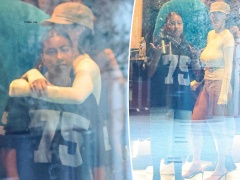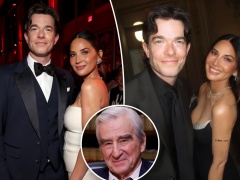
Prince Harry’s ghostwriter revealed that working on the Duke of Sussex’s memoir, “Spare,” wasn’t exactly a walk in the park.
“I was exasperated with Prince Harry,” J. R. Moehringer wrote in the New Yorker Monday, recalling one particularly tense Zoom call that took place at 2 a.m.
“My head was pounding, my jaw was clenched and I was starting to raise my voice.”
Things became so strained between the two that Moehringer, 58, thought he might be fired from the project.
“Some part of me was still able to step outside the situation and think, ‘This is so weird. I’m shouting at Prince Harry,'” he shared. “Then, as Harry started going back at me, as his cheeks flushed and his eyes narrowed, a more pressing thought occurred: ‘Whoa, it could all end right here.'”

It was the summer of 2022, and the novelist and Harry had “come to a difficult passage” concerning the prince’s time in the British Army that they kept disagreeing on two years into their working relationship.

At the end of a grueling military exercise, Harry was “captured by pretend terrorists,” according to Moehringer.
“He’s hooded, dragged to an underground bunker, beaten, frozen, starved, stripped, forced into excruciating stress positions by captors wearing black balaclavas,” according to Moehringer.
The point of the simulation was to determine whether the royal had what it took to survive a real-life capture in a war zone.

In the end, Harry’s “kidnappers” threw him against a wall, choked and hurled insults at him, including a cruel dig about his late mother, Princess Diana. (One of the participants later apologized.)
“Harry always wanted to end this scene with a thing he said to his captors, a comeback that struck me as unnecessary, and somewhat inane,” the “Tender Bar” author wrote, noting that he had always resisted including the remark during the editing process.
Finally, during the tense Zoom call, Harry explained his mindset.
“He exhaled and calmly explained that, all his life, people had belittled his intellectual capabilities, and this flash of cleverness proved that, even after being kicked and punched and deprived of sleep and food, he had his wits about him,” Moehringer wrote.

But the writer doubled down that the retort was an unnecessary inclusion.
Harry eventually conceded and then quipped: “‘I really enjoy getting you worked up like that.'”
More must-see royals coverage:
- How Prince Harry and Meghan Markle met
- Prince William and Kate Middleton’s relationship timeline
- Royal family tree and line of succession
Moehringer was first approached about ghostwriting “Spare” in the summer of 2020. He admittedly “hesitated” at first but then found out it was for Prince Harry, so he agreed because he “was curious, of course.”

Although they got along right away, Moehringer was also “concerned” because he was not sure how much the Invictus Games founder wanted to reveal in the book.
However, he ultimately found the prince’s story both “relatable and infuriating,” explaining, “The way he’d been treated, by both strangers and intimates, was grotesque.”
As the COVID-19 pandemic waned, Moehringer was able to travel to Montecito, Calif., to meet Harry in real life.

The duke won over the author’s daughter with his encyclopedic knowledge of “Moana,” revealing that his favorite scene is when Hei Hei, the chicken, is lost at sea.
Moehringer also revealed that he went twice by himself to stay in Harry and Meghan Markle’s guesthouse, where “Meghan and [their son] Archie would visit me on their afternoon walks.
“Meghan, knowing I was missing my family, was forever bringing trays of food and sweets,” he remembered.

As the work progressed, Harry became excited by the idea of rebutting all the falsehoods published about him in the press.
Moehringer wrote that he was shocked by the media frenzy when “Spare” was finally published in January, saying he was even stalked by reporters and photographers, which he found frightening.
Harry, for his part, was “self-possessed and expansive” while giving a speech thanking his publishing team at a book party thrown by a friend.
“He mentioned my advice, to ‘trust the book,’ and said he was glad that he did, because it felt incredible to have the truth out there, to feel — his voice caught — ‘free,'” Moehringer wrote. “There were tears in his eyes. Mine, too.”






